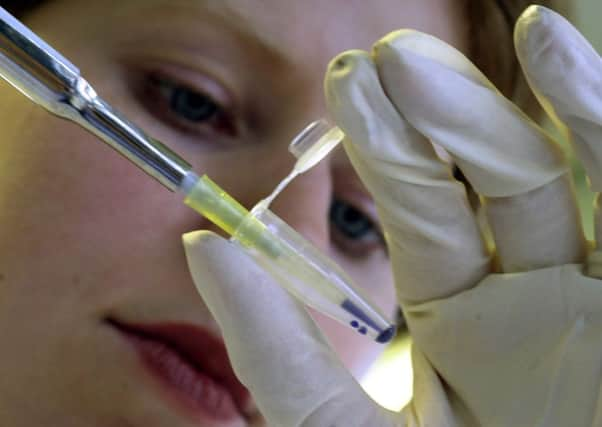Scots scientists pinpoint genes that shorten life by three years


Using genetic data from more than 152,000 people aged between 40 and 69, the study pinpointed two inherited variants in the genetic code which may affect how long someone lives.
One variant lies in a gene associated with an increased risk of lung cancer and severe respiratory problems among smokers, while the other is in a gene associated with Alzheimer’s disease.
Advertisement
Hide AdAdvertisement
Hide AdExperts said the findings were the “tip of the iceberg” and could have a major impact on our understanding of how genes determine life span, as well as helping scientists develop better treatments.
More than two thirds of us will inherit a single copy of these variants from a parent, which could reduce life expectancy by up to a year, according to a study by Edinburgh University.Around three in 1,000 people will inherit two copies of both variants, meaning they can expect to die up to three years earlier.
The gene change linked to Alzheimer’s disease had a greater effect on women while the variation associated with lung disease had greatest effect on men.
Dr Jim Wilson, of the university’s Usher Institute of Population Health Sciences and Informatics, said: “These discoveries are the tip of the iceberg. As more data become available later this year, we expect to see many more discoveries.”
The team looked at more than 37 million letters of DNA to uncover these two variants, using the first batch of genetic information from the UK Biobank study, which will release the rest of its data this year.
Dr Peter Joshi, who also worked on the study published in the Nature Communications journal, said: “The huge data pool allows us to say with great confidence that these changes are making a difference.
“Clearly these are units that are already linked with disease but now we can say they are also linked to life span separately from that.
“We’ve identified these major variants but there must be plenty of smaller ones which we can find. We hope to have a much better vision of the whole shape of lifespan and how our genes determine it.”
Despite the importance of these findings, Dr Joshi warned that lifestyle is still the most important factor in determining life span.